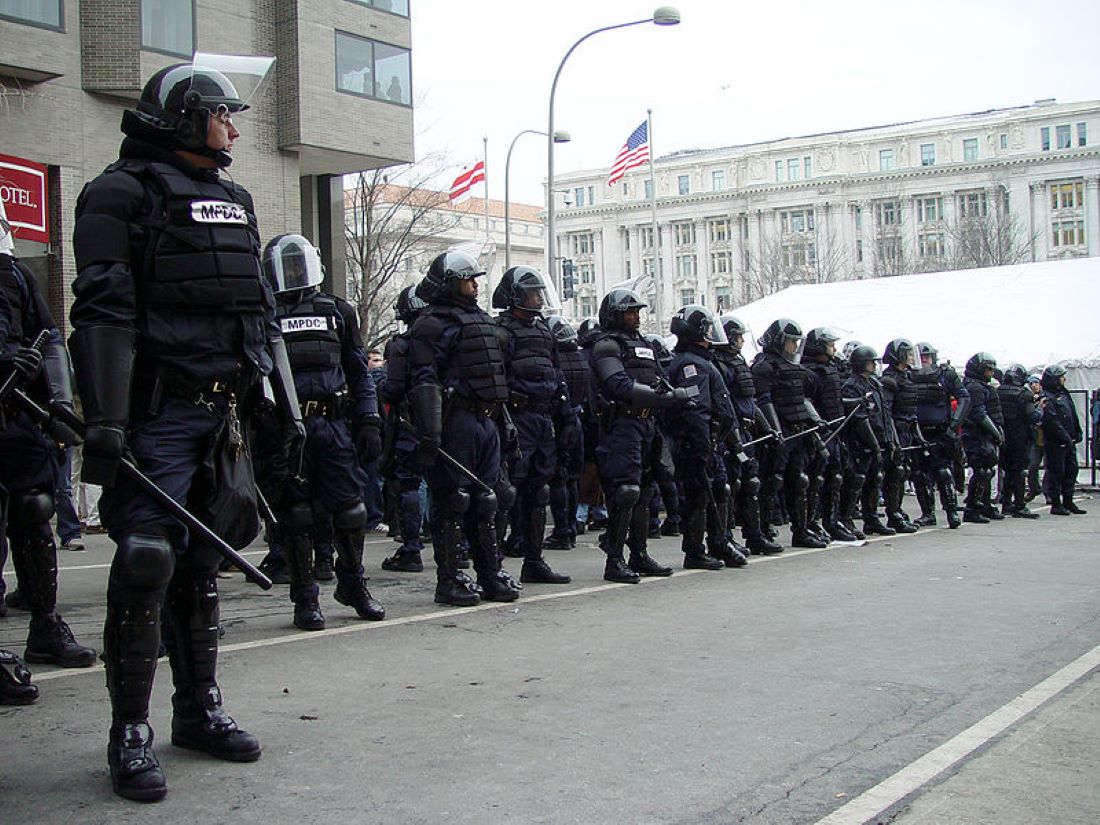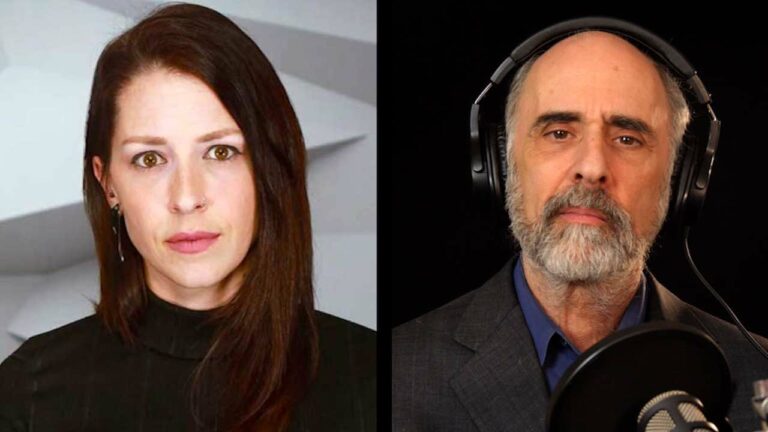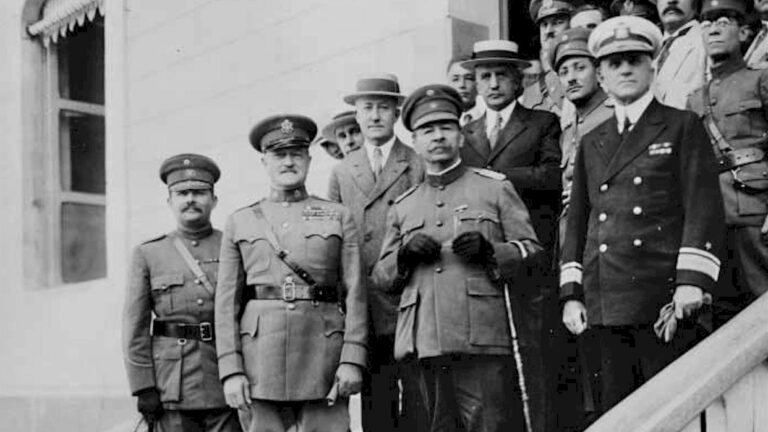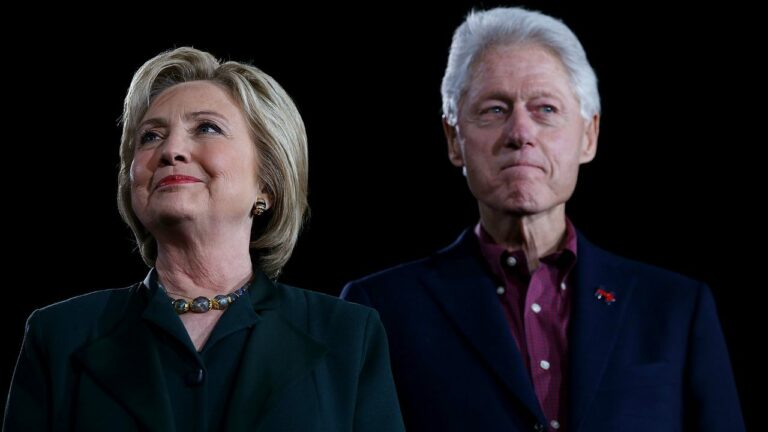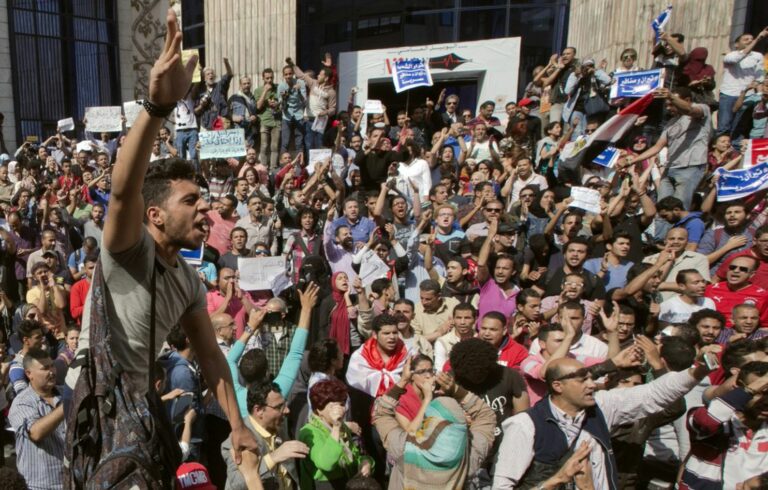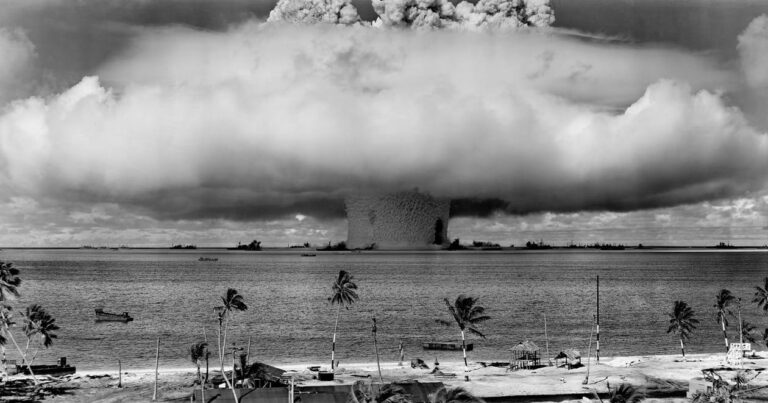Moving Towards a Police State – Michael Ratner on Reality Asserts Itself Pt 7/7
Mr. Ratner tells Paul Jay that he warned of a growing police state a month after 9/11, as constitutional rights continue to evaporate in the name of national security. This is an episode of Reality Asserts Itself, produced March 13, 2014 with Paul Jay.
STORY TRANSCRIPT
PAUL JAY, SENIOR EDITOR, TRNN: Welcome back to The Real News Network. I’m Paul Jay in Baltimore. And this is Reality Asserts Itself with our guest Michael Ratner, who joins us again in the studio.
Thanks for joining us again, Michael.
MICHAEL RATNER, PRESIDENT EMERITUS, CENTER FOR CONSTITUTIONAL RIGHTS: Always good to be with you, Paul.
JAY: So, Michael, one more time, is president emeritus of the Center for Constitutional Rights in New York. He’s a board member of The Real News Network. And he’s the American lawyer for WikiLeaks and Julian Assange. And if you want to know more about Michael, there’s lots of biography down below, but most importantly, this whole series of interviews is about Michael’s life, so just watch it.
So we’re going to pick up–we’re going to kind of jump ahead. We were in the ’80s, and we’re kind of running out of time, so we’re going to kind of do the ’90s another time, more or less, and we’re going to pick up in 2001, because since the attack on the World Trade Center, this has defined a lot of your life over the last more than decade.
You actually saw it happen.
RATNER: I was in my house in downtown and I was going out for a run, and I’m going down, running past the World Trade Center. A beautiful eggshell blue day, sunny. I’m running past the World Trade Center, and I hear this huge explosion. And I look up, and I see one of the World Trade Centers just enveloped in flames almost immediately. I stop, I walk over to a construction site, and we see the outline of a plane right in the building. It looks like a plane just flew right directly into it. And we had no idea it was terrorism, none at all, zero, standing there with the other construction workers. Our cell phones are still working, as I recall, then, and we call people and say, what’s going on, and they say, well, it looks like a plane flew in.
And then I’m just standing down there watching, and about–maybe it was 20 minutes later, I see a plane. It looks like coming up the Hudson, from the south. I’m not sure, but I think south. And I’m thinking, well, that plane is there to inspect the damage on the building and maybe drop water on top of it. That’s how–we did not expect this. And instead, that plane turns around, comes around to the back side, and flies right into the other World Trade Center building. At that point I say, well, this is really bad. This is intentional. It’s terrorism–or, I mean, I didn’t use that word. I’m not sure.
But then I got actually really scared. And then I have two kids in schools that are right in that neighborhood. And then I just run home as fast as I can, thinking, what’s going to happen next, what’s going to blow up next. At that point there’s no cell service. Everything’s gone.
At that point I’m–I just run home. I go to my apartment. And we make sure our kids are safe. In fact, one of the planes had flown within a few hundred feet over my daughter’s school. We go get our kids at the schools.
And at that point what do you do? Well, first we stand on the street. And you can see down 7th Avenue, and you can see the buildings just in flames, and you just actually saw them pancake to the bottom. I mean, we saw the whole thing.
And with our kids, we picked them up. And we want to do something constructive. So we get all the kids from the school, a dozen kids at our house, and we make sandwiches together to bring to the hospital or to bring somewhere where we think there are going to be survivors. In fact, of course, there weren’t people who really needed our sandwiches.
And, you know, it’s obviously an incredible thing we saw. My kids were ten and 12.
For the next two weeks the city–more than that–the city’s just in mourning. And because I live downtown, there’s ash everywhere, there’s the smell everywhere for weeks, just weeks of it. And friends are living in my house–the ones who lived right nearby had to abandon their houses completely.
And then you go to these vigils, and there’s just, like, boards, like, 20, 30 feet, with tags on them: Have you seen my father? Have you seen my mother? You know, people wondering what’s happened to their parents.
And then you knew people, obviously, ’cause we were living downtown in New York, you know, you know, my kid’s soccer coach or something. You know, just you knew people.
JAY: Within a month, or just a little over a month of that day, you write a piece called “We’re Moving towards a Police State”.
RATNER: You know, my reaction to it was that it was so horrendous, what I saw and felt then. And there was such talk of war in the country, and Bush gives his, you know, crusade speech, that we’re going to go on a crusade–great choice of words. On September 18, Congress passes the Authorization to Use Military Force very close to that time. The Patriot Act is passed six weeks afterwards. You’re getting a whole set of both laws that are going to allow massive surveillance and, you know, all kinds of other things to people all over the world, and you’re getting the authorization to use war whenever you want, the president wants to, anywhere in the world, that he can go after, even in the United States, the authorization to use military force. And you’re getting this bellicose speech.
And I’m sitting there saying to myself, look what I’ve just seen. The last thing I want to do is visit war on another population. That’s the last thing. I mean, what a horrible thing to do. Look what I’ve just seen, and war is much worse. War is–I mean, 3,000 people is horrible, but a million people in Iraq, which is what we have now, probably, is–I mean, you can’t–it’s unfathomable.
So I’m sitting there saying, I don’t want a war. This should be treated as a crime, and we should find out who the perpetrators are, get them arrested, and get them tried.
And then, of course, there’s no context as to why it happened. You couldn’t even ask. You know. And I think I remember Susan Sontag wrote something about why, and she basically was drummed out of the world, practically. I mean, so you couldn’t even speak up.
But I’m looking at it, and here I am. I have this long history, obviously, of protecting civil rights and civil liberties, and I understand something about context, although people knew nothing about being a Muslim then, anybody, even sophisticated people. Just nothing. Nothing. This is a blank. [incompr.] the FBI, I think, had two Arabic translators. The whole thing is, like, you know–it was just this, like–whatever.
So I’m looking at it and saying, look at this repression that’s coming down on us. We’re basically building a police state here. We’re going to be allowing, basically, unauthorized wiretapping, which we didn’t even know about, the warrantless wiretapping. What they already had done was so bad that we came out against it.
Immigration–we had clients picked up all over the city, Muslims. Because you were between a certain age, from certain countries, they would just be jailing you. And then they checkerboard you around various jails, and you couldn’t find your clients. We got calls from mothers, fathers, sisters, brothers: Where’s my son? Where’s my son? Hundreds of those people picked up all over, and beaten, and put in those three-piece chained suits, beaten, done nothing, zero, nothing wrong. They were Muslim of a certain age and the wrong country. Then a program to fingerprint and question every single Muslim between 18 and 35 in the country who was here on an immigrant visa. Every single one. I mean, so it was really strong.
And then the wars. You know, first, obviously, the bombing of Afghanistan. And that was interestingly tricky, because I opposed the war, completely opposed the war. Apart from there being some negotiations about [incompr.] the Taliban and turning over bin Laden at an international court, I just thought it was going to be hundreds of thousands killed or tens of thousands killed.
And interestingly, some people who were normally antiwar didn’t oppose it. They were so appalled by 9/11 that they actually left their reason and their understanding of who this country is, they left it in a ditch somewhere. And I actually had some debates with people who, by the end, they realized that I was right, even before the war. But it was a serious moment to come out against that war. And a lot of good people, unfortunately, supported that war. So there was first the Afghan War, which we’re still seeing today, a country that’s destroyed that now has, you know, the highest opium production in the world.
So I’m sitting there. I write these articles. I start doing that. Very little is picked up on it, very few allies.
And then, on November 14, 2001, President Bush issues what’s called Military Order No. 1. That’s the Guantanamo order. That’s the one that says, I’m the president, we can pick up people anywhere in the world at that point, non-citizens [incompr.] citizens, anywhere in the world, and we can hold them forever. And if we try them, they’re going to be tried in special military commissions.
And I–sitting at the office, and I’m saying to my colleagues, we have to–and they–we have to challenge this. They abolished the writ of habeas corpus, etc. And no one would go with us, literally no one. No other human rights organization. A couple of other lawyers went with us, but no other human rights organization. And so we’re out there alone saying, we’re going to represent the first people. I have stacks of hate mail 500-high saying, you know, let–you go see the Taliban, let them go eat your children, all that kind of stuff.
And then it turns out to be Guantanamo where they’re going to send the people. That’s January 11, 2002. [incompr.] you know, they’re incognito, etc. We wind up deciding to represent the first people at Guantanamo. I had earlier represented Guantanamo people, Haitians who had been at Guantanamo in the early ’90s, the HIV Camp, which I was successful with others in closing. This is the second reiteration of Guantanamo and Cuba, and we’re the first people out there.
For the first two years, nothing. I mean, we couldn’t get any allies. We couldn’t even get our lawyer to file the case initially in Washington for us, ’cause we needed a local counsel.
JAY: We have talked about this period quite a bit in other interviews. And you can–we’re going to have a whole page you can get to to see all of Michael’s interviews. So we’ve done a lot of detail on post-9/11–Patriot Act, Guantanamo.
RATNER: Drones. Everything.
JAY: Drones.
RATNER: We’ve done all that stuff. Torture. We’ve done millions [crosstalk]
JAY: We’re kind of running out of time, so I kind of want to ask you a big-picture question.
RATNER: Okay.
JAY: You have been fighting in many fronts, but your primary front has been fighting on a legal front in courts. You work for something–or you did–for something called the Center for Constitutional Rights,–
RATNER: Still do.
JAY: –which presupposes that there is a Constitution and there is a rule of law. So, you know, “Moving towards a Police State”, the title of what you wrote–I mean, in a police state, you don’t have a rule of law, you have straight arbitrary power. I mean, there may be some laws, but they don’t have much to do with any constitutional rights. To what extent is this still a country where there is a rule of law based on a constitution with rights? I know we’re–you know, there’s–somewhere, I guess, you have, you know, a pole, which is, like, some kind of Hitlerite police state, where there are no rights; at some point you have, you know, some people would call a democracy–some people might call it a bourgeois democracy, but still there is constitutional rights, and you can go to court and win some cases. Where are we on this?
RATNER: Let me just say, you know, underlying the philosophy of the Center for Constitutional Rights and my own is that social change happens through activism, and that the role of lawyers like me, in general–there are some exceptions–in general, is to support social movements. So it’s supporting the antiwar movement in Central America. In the Guantanamo case it was a little different, because we didn’t have a social movement. There we had to do something that I don’t often do: go into a court, trying to actually win any kind of legal right, so that we can even visit the people and stop what became torture. So the Center was founded out of representing movements. So I look at courts as an adjunct to that, sometimes used and sometimes not.
To answer your question, I would say to some extent it depends. So, for example, the Center for Constitutional Rights recently won the stop-and-frisk case in New York. Yes, we had a terrible mayor, Bloomberg, who wasn’t going to enforce it, who appealed it. Now we have a mayor who at least didn’t appeal it, and now we’re going to have a change on that. But even that, there were 40 organizations from across all walks of life, all races, all religions, with us in that case, grassroots organizations doing the work. The lawsuit became the way in which we could translate that into a victory, ultimately.
But to answer your question, on that kind of constitutional right we’re not at the end of the road yet. We [incompr.] similar case we won against the New York City Fire Department for discrimination. You know, it had 3 percent blacks in a city that’s 30 percent, 25 percent black–I mean, incredible, in New York. This is, like, racist to the core. So that kind of stuff, I think, is still there to litigate. Although people say, oh, we have a black, you know, president, we have–all this stuff is over, you still have problems on that.
On the other fundamental rights I’m talking about, the way–the rights to free speech, the right to be free from a search, the right to be free from arbitrary imprisonment, those are evaporating in the name of national security. There’s just no question about it. Those we don’t win anymore. We won a theoretical right to get people out of Guantanamo, for example, by testing their detentions in court, but the courts have never actually–or one exception–ever ordered the release of anybody from Guantanamo, because they’ll give us the theoretical oh, yeah, you have a right to go to court, but we’re not going to give it to you.
Recently, the court just held we have a right to challenge people’s conditions at Guantanamo that they live under. For 12 years we haven’t had that right. All of a sudden they gave us that right, 12 years later. The first condition we challenged was the forced feeding of people at Guantanamo on a hunger strike, strapped into a chair, tubes down the nose, the whole business, and the court said, well, that’s okay. So you’re–the answer is that I think, on the fundamental rights of our security, I mean, of our constitutional security, I think those have evaporated to a large extent.
JAY: And they seem to be creating the legal framework, which they’re not, as far as I know, really using yet, but a legal framework for a full-fledged police state, the NDAA amendment, which allows the army to actually arrest people, you know, for having some kind of association with terrorism. It seems pretty vague, you know, what they have to prove to do that.
RATNER: Well, that, coupled with the national surveillance state. I mean, everything we say and do, every association I have, if and when there’s ever another Occupy Wall Street or Occupy this or a revolution in the streets, you know, [incompr.] cold, they’d pick people up cold. No, we have the–certainly the framework is there for imposing, you know, very heavy measures against citizens and people in this country.
JAY: The media, which–like, if you follow The New York Times and some of the other conventional media, they will do a story on the NSA spying. They will pick pieces of the surveillance state. But in terms of the media–you know, people understanding the extent to which this legal framework has been created, the shift away from constitutional rights, the media seems to just either blindly go along with this, is afraid to stick your neck out and say anything. The debate over that NDAA amendment was mostly in the independent alternative press. The mainstream media barely talked about what to me is one of the more dramatic pieces of legislation that’s been passed in a long time.
RATNER: Yeah, no, the media has been terrible on this issue and not taking on what I consider to be the big issues.
You know, so right now, as you said, I’m representing WikiLeaks and Julian Assange, and I’ve done a lot of interviews for you about that. But on this whole issue of surveillance, on what the state can do to pick people up on arbitrary detention, I think we’re at a real crucial turning point. I mean, I look at Snowden or Julian or Jeremy Hammond, who’s in for the Stratfor hacks, or Barrett Brown or other of–or Sarah Harrison, who’s sitting in Berlin, who took Snowden from Berlin to Moscow–I mean, from Hong Kong to Moscow. We’re at the verge of deciding how–what’s going to happen in the future. Is it going to be a state in which the government, from a vertical point of view, controls the internet completely, controls our information completely, and knows everything about our lives? Or are we going to be able to make it more horizontal, where we can actually have some kind of democracy? And I think these people, in my view, are heroes, because they’re taking on the state much like people took on the state in the ’60s. And I do a comparison with that. And the state is repressing them much like they did in the ’60s and passing laws to make sure that they can’t do that.
But the press has just been, as you said, I think, piecemeal in a terrible way. I mean, even I follow this stuff very closely. You know, do I have a really big picture of what’s happening? Absolutely not.
JAY: Thanks for joining us. We’re going to continue this, I’m sure, many times.
RATNER: Thanks for having me, Paul. And thanks for this wonderful new studio. I love it here.
JAY: Well, thank you.
And thank you for joining us on Reality Asserts Itself on The Real News.
END
Podcast: Play in new window | Download
